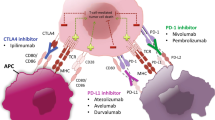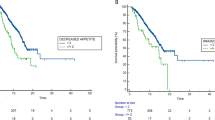Abstract
Background
The prognostic impact of immune-related adverse events during immune checkpoint inhibitor-based combination therapy for advanced renal cell carcinoma remains unclear, especially in terms of differences between regimens.
Objective
We aimed to clarify the prognostic impact of immune-related adverse events in patients with advanced renal cell carcinoma receiving immune checkpoint inhibitor dual combination therapy (IO-IO) or immune checkpoint inhibitor plus tyrosine kinase inhibitor combination therapy (IO-TKI).
Methods
We retrospectively evaluated the data of 148 patients who received immune checkpoint inhibitor-based combination therapy as first-line therapy. Patients were divided into two groups based on regimens, namely IO-IO and IO-TKI. The associations between immune-related adverse event development and outcomes, such as progression-free survival, overall survival, and objective response rate, were compared between the two groups.
Results
In the IO-IO and IO-TKI groups, 67 of 91 (74%) and 31 of 57 (54%) patients, respectively, experienced at least one immune-related adverse event and the rate was significantly higher in the IO-IO group (p = 0.0204), where immune-related adverse events development was significantly associated with longer progression-free survival (p < 0.0001) and overall survival (p = 0.0102), and a higher objective response rate (p = 0.0028). A multivariate analysis revealed immune-related adverse event development as an independent factor for longer progression-free survival (hazard ratio, 0.25; p < 0.0001) and overall survival (hazard ratio, 0.42; p = 0.0287). There were no significant associations between immune-related adverse events and progression-free survival, overall survival, or objective response rate in the IO-TKI group.
Conclusions
The development of immune-related adverse events was positively associated with the outcome of patients with advanced renal cell carcinoma treated with IO-IO combination therapy; no such correlation was observed for IO-TKI combination therapy.


Similar content being viewed by others
References
Motzer RJ, Tannir NM, McDermott DF, Aren Frontera O, Melichar B, Choueiri TK, et al. Nivolumab plus ipilimumab versus sunitinib in advanced renal-cell carcinoma. N Engl J Med. 2018;378(14):1277–90. https://doi.org/10.1056/NEJMoa1712126.
Rini BI, Plimack ER, Stus V, Gafanov R, Hawkins R, Nosov D, et al. Pembrolizumab plus axitinib versus sunitinib for advanced renal-cell carcinoma. N Engl J Med. 2019;380(12):1116–27. https://doi.org/10.1056/NEJMoa1816714.
Motzer RJ, Penkov K, Haanen J, Rini B, Albiges L, Campbell MT, et al. Avelumab plus axitinib versus sunitinib for advanced renal-cell carcinoma. N Engl J Med. 2019;380(12):1103–15. https://doi.org/10.1056/NEJMoa1816047.
Choueiri TK, Powles T, Burotto M, Escudier B, Bourlon MT, Zurawski B, et al. Nivolumab plus cabozantinib versus sunitinib for advanced renal-cell carcinoma. N Engl J Med. 2021;384(9):829–41. https://doi.org/10.1056/NEJMoa2026982.
Motzer R, Alekseev B, Rha SY, Porta C, Eto M, Powles T, et al. Lenvatinib plus pembrolizumab or everolimus for advanced renal cell carcinoma. N Engl J Med. 2021;384(14):1289–300. https://doi.org/10.1056/NEJMoa2035716.
Lombardi P, Filetti M, Falcone R, Di Bidino R, Iacovelli R, Ciccarese C, et al. New first-line immunotherapy-based combinations for metastatic renal cell carcinoma: a systematic review and network meta-analysis. Cancer Treat Rev. 2022;106: 102377. https://doi.org/10.1016/j.ctrv.2022.102377.
Rathi N, Maughan BL, Agarwal N, Swami U. The tango of immunotherapy and targeted therapy in metastatic renal cell carcinoma. Transl Cancer Res. 2019;8(8):E1-6. https://doi.org/10.21037/tcr.2019.07.02.
Motzer RJ, Jonasch E, Agarwal N, Alva A, Baine M, Beckermann K, et al. Kidney cancer, version 3.2022, NCCN clinical practice guidelines in oncology. J Natl Compr Canc Netw. 2022;20(1):71–90. https://doi.org/10.6004/jnccn.2022.0001.
Ljungberg B, Albiges L, Abu-Ghanem Y, Bedke J, Capitanio U, Dabestani S, et al. European Association of Urology guidelines on renal cell carcinoma: the 2022 update. Eur Urol. 2022;82(4):399–410. https://doi.org/10.1016/j.eururo.2022.03.006.
Stühler V, Herrmann L, Rausch S, Stenzl A, Bedke J. Real world data on IO-based therapy for metastatic renal cell carcinoma. J Cancer Res Clin Oncol. 2022. https://doi.org/10.1007/s00432-022-04173-0.
Ishihara H, Nemoto Y, Nakamura K, Tachibana H, Fukuda H, Yoshida K, et al. Changes in real-world outcomes in patients with metastatic renal cell carcinoma from the molecular-targeted therapy era to the immune checkpoint inhibitor era. Target Oncol. 2022;17(3):307–19. https://doi.org/10.1007/s11523-022-00879-w.
Michot JM, Bigenwald C, Champiat S, Collins M, Carbonnel F, Postel-Vinay S, et al. Immune-related adverse events with immune checkpoint blockade: a comprehensive review. Eur J Cancer. 2016;54:139–48. https://doi.org/10.1016/j.ejca.2015.11.016.
Postow MA, Sidlow R, Hellmann MD. Immune-related adverse events associated with immune checkpoint blockade. N Engl J Med. 2018;378(2):158–68. https://doi.org/10.1056/NEJMra1703481.
Haratani K, Hayashi H, Chiba Y, Kudo K, Yonesaka K, Kato R, et al. Association of immune-related adverse events with nivolumab efficacy in non-small-cell lung cancer. JAMA Oncol. 2018;4(3):374–8. https://doi.org/10.1001/jamaoncol.2017.2925.
Berner F, Bomze D, Diem S, Ali OH, Fassler M, Ring S, et al. Association of checkpoint inhibitor-induced toxic effects with shared cancer and tissue antigens in non-small cell lung cancer. JAMA Oncol. 2019;5(7):1043–7. https://doi.org/10.1001/jamaoncol.2019.0402.
Foster CC, Couey MA, Kochanny SE, Khattri A, Acharya RK, Tan YC, et al. Immune-related adverse events are associated with improved response, progression-free survival, and overall survival for patients with head and neck cancer receiving immune checkpoint inhibitors. Cancer. 2021;127(24):4565–73. https://doi.org/10.1002/cncr.33780.
Freeman-Keller M, Kim Y, Cronin H, Richards A, Gibney G, Weber JS. Nivolumab in resected and unresectable metastatic melanoma: characteristics of immune-related adverse events and association with outcomes. Clin Cancer Res. 2016;22(4):886–94. https://doi.org/10.1158/1078-0432.ccr-15-1136.
Xing P, Zhang F, Wang G, Xu Y, Li C, Wang S, et al. Incidence rates of immune-related adverse events and their correlation with response in advanced solid tumours treated with NIVO or NIVO+IPI: a systematic review and meta-analysis. J Immunother Cancer. 2019;7(1):341. https://doi.org/10.1186/s40425-019-0779-6.
Toi Y, Sugawara S, Kawashima Y, Aiba T, Kawana S, Saito R, et al. Association of immune-related adverse events with clinical benefit in patients with advanced non-small-cell lung cancer treated with nivolumab. Oncologist. 2018;23(11):1358–65. https://doi.org/10.1634/theoncologist.2017-0384.
Sanlorenzo M, Vujic I, Daud A, Algazi A, Gubens M, Luna SA, et al. Pembrolizumab cutaneous adverse events and their association with disease progression. JAMA Dermatol. 2015;151(11):1206–12. https://doi.org/10.1001/jamadermatol.2015.1916.
Maher VE, Fernandes LL, Weinstock C, Tang S, Agarwal S, Brave M, et al. Analysis of the association between adverse events and outcome in patients receiving a programmed death protein 1 or programmed death ligand 1 antibody. J Clin Oncol. 2019;37(30):2730–7. https://doi.org/10.1200/jco.19.00318.
Maeda T, Yoshino K, Nagai K, Oaku S, Kato M, Hiura A, et al. Development of endocrine immune-related adverse events and improved survival in advanced melanoma patients treated with nivolumab monotherapy. Eur J Cancer. 2019;115:13–6. https://doi.org/10.1016/j.ejca.2019.04.005.
Pinato DJ, Marron TU, Mishra-Kalyani PS, Gong Y, Wei G, Szafron D, et al. Treatment-related toxicity and improved outcome from immunotherapy in hepatocellular cancer: evidence from an FDA pooled analysis of landmark clinical trials with validation from routine practice. Eur J Cancer. 2021;157:140–52. https://doi.org/10.1016/j.ejca.2021.08.020.
Martini DJ, Hamieh L, McKay RR, Harshman LC, Brandao R, Norton CK, et al. Durable clinical benefit in metastatic renal cell carcinoma patients who discontinue PD-1/PD-L1 therapy for immune-related adverse events. Cancer Immunol Res. 2018;6(4):402–8. https://doi.org/10.1158/2326-6066.cir-17-0220.
Vitale MG, Pipitone S, Venturelli M, Baldessari C, Porta C, Iannuzzi F, et al. Correlation between immune-related adverse event (IRAE) occurrence and clinical outcome in patients with metastatic renal cell carcinoma (mRCC) treated with nivolumab: IRAENE Trial, an Italian multi-institutional retrospective study. Clin Genitourin Cancer. 2020;18(6):477–88. https://doi.org/10.1016/j.clgc.2020.05.010.
Ishihara H, Takagi T, Kondo T, Homma C, Tachibana H, Fukuda H, et al. Association between immune-related adverse events and prognosis in patients with metastatic renal cell carcinoma treated with nivolumab. Urol Oncol. 2019;37(6):355.e21-9. https://doi.org/10.1016/j.urolonc.2019.03.003.
Ikeda T, Ishihara H, Nemoto Y, Tachibana H, Fukuda H, Yoshida K, et al. Prognostic impact of immune-related adverse events in metastatic renal cell carcinoma treated with nivolumab plus ipilimumab. Urol Oncol. 2021;39(10):735.e9-16. https://doi.org/10.1016/j.urolonc.2021.05.012.
Ishihara H, Nemoto Y, Nakamura K, Ikeda T, Tachibana H, Fukuda H, et al. Prognostic impact of early treatment interruption of nivolumab plus ipilimumab due to immune-related adverse events as first-line therapy for metastatic renal cell carcinoma: a multi-institution retrospective study. Target Oncol. 2021;16(4):493–502. https://doi.org/10.1007/s11523-021-00825-2.
Kato T, Nagahara A, Kawamura N, Nakata W, Soda T, Matsuzaki K, et al. The prognostic impact of immune-related adverse events in metastatic renal cell carcinoma patients treated with nivolumab: a real-world multi-institutional retrospective study. Int J Clin Oncol. 2021;26(5):954–61. https://doi.org/10.1007/s10147-021-01872-5.
Motzer RJ, Escudier B, McDermott DF, Arén Frontera O, Melichar B, Powles T, et al. Survival outcomes and independent response assessment with nivolumab plus ipilimumab versus sunitinib in patients with advanced renal cell carcinoma: 42-month follow-up of a randomized phase 3 clinical trial. J Immunother Cancer. 2020;8(2): e000891. https://doi.org/10.1136/jitc-2020-000891.
Tachibana H, Kondo T, Ishihara H, Fukuda H, Yoshida K, Takagi T, et al. Modest efficacy of nivolumab plus ipilimumab in patients with papillary renal cell carcinoma. Jpn J Clin Oncol. 2021;51(4):646–53. https://doi.org/10.1093/jjco/hyaa229.
Eisenhauer EA, Therasse P, Bogaerts J, Schwartz LH, Sargent D, Ford R, et al. New response evaluation criteria in solid tumours: revised RECIST guideline (version 1.1). Eur J Cancer. 2009;45(2):228–47. https://doi.org/10.1016/j.ejca.2008.10.026.
Hofmann L, Forschner A, Loquai C, Goldinger SM, Zimmer L, Ugurel S, et al. Cutaneous, gastrointestinal, hepatic, endocrine, and renal side-effects of anti-PD-1 therapy. Eur J Cancer. 2016;60:190–209. https://doi.org/10.1016/j.ejca.2016.02.025.
Postow MA, Chesney J, Pavlick AC, Robert C, Grossmann K, McDermott D, et al. Nivolumab and ipilimumab versus ipilimumab in untreated melanoma. N Engl J Med. 2015;372(21):2006–17. https://doi.org/10.1056/NEJMoa1414428.
Johnson DB, Nebhan CA, Moslehi JJ, Balko JM. Immune-checkpoint inhibitors: long-term implications of toxicity. Nat Rev Clin Oncol. 2022;19(4):254–67. https://doi.org/10.1038/s41571-022-00600-w.
Bernier M, Guillaume C, Leon N, Alexandre J, Hamel-Senecal L, Chretien B, et al. Nivolumab causing a polymyalgia rheumatica in a patient with a squamous non-small cell lung cancer. J Immunother. 2017;40(4):129–31. https://doi.org/10.1097/cji.0000000000000163.
Calabrese C, Kirchner E, Kontzias K, Velcheti V, Calabrese LH. Rheumatic immune-related adverse events of checkpoint therapy for cancer: case series of a new nosological entity. RMD Open. 2017;3(1): e000412. https://doi.org/10.1136/rmdopen-2016-000412.
Moreira A, Loquai C, Pföhler C, Kähler KC, Knauss S, Heppt MV, et al. Myositis and neuromuscular side-effects induced by immune checkpoint inhibitors. Eur J Cancer. 2019;106:12–23. https://doi.org/10.1016/j.ejca.2018.09.033.
Johansen A, Christensen SJ, Scheie D, Højgaard JLS, Kondziella D. Neuromuscular adverse events associated with anti-PD-1 monoclonal antibodies: systematic review. Neurology. 2019;92(14):663–74. https://doi.org/10.1212/wnl.0000000000007235.
National Cancer Institute. Common Terminology Criteria for Adverse Events (CTCAE) v.4. Available from: http://evs.nci.nih.gov/ftp1/CTCAE/About.html. Accessed 21 Dec 2022.
Khoja L, Day D, Wei-Wu Chen T, Siu LL, Hansen AR. Tumour- and class-specific patterns of immune-related adverse events of immune checkpoint inhibitors: a systematic review. Ann Oncol. 2017;28(10):2377–85. https://doi.org/10.1093/annonc/mdx286.
Nocera L, Karakiewicz PI, Wenzel M, Tian Z, Shariat SF, Saad F, et al. Clinical outcomes and adverse events after first-line treatment in metastatic renal cell carcinoma: a systematic review and network meta-analysis. J Urol. 2022;207(1):16–24. https://doi.org/10.1097/ju.0000000000002252.
Bosma NA, Warkentin MT, Gan CL, Karim S, Heng DYC, Brenner DR, et al. Efficacy and safety of first-line systemic therapy for metastatic renal cell carcinoma: a systematic review and network meta-analysis. Eur Urol Open Sci. 2022;37:14–26. https://doi.org/10.1016/j.euros.2021.12.007.
Albiges L, Tannir NM, Burotto M, McDermott D, Plimack ER, Barthélémy P, et al. Nivolumab plus ipilimumab versus sunitinib for first-line treatment of advanced renal cell carcinoma: extended 4-year follow-up of the phase III CheckMate 214 trial. ESMO Open. 2020;5(6): e001079. https://doi.org/10.1136/esmoopen-2020-001079.
Martins F, Sofiya L, Sykiotis GP, Lamine F, Maillard M, Fraga M, et al. Adverse effects of immune-checkpoint inhibitors: epidemiology, management and surveillance. Nat Rev Clin Oncol. 2019;16(9):563–80. https://doi.org/10.1038/s41571-019-0218-0.
Acknowledgements
The authors thank Ms. Nobuko Hata (Department of Urology, Tokyo Women’s Medical University) for her secretarial efforts.
Author information
Authors and Affiliations
Corresponding author
Ethics declarations
Funding
No external funding was used in the preparation of this article.
Conflicts of interest
Toshio Takagi received honoraria from BristolMyers Squibb and Ono Pharmaceutical. Tsunenori Kondo received honoraria from Pfizer, Novartis, Bristol-Myers Squibb, and Ono Pharmaceutical. Hiroki Ishihara, Yuki Nemoto, Kazutaka Nakamura, Hidekazu Tachibana, Hironori Fukuda, Kazuhiko Yoshida, Hirohito Kobayashi, Junpei Iizuka, Hiroaki Shimmura, and Yasunobu Hashimoto have no conflicts of interest that are directly relevant to the content of this article.
Ethics approval
The study protocol was approved by the institutional ethics review board of each institution (Tokyo Women’s Medical University, Tokyo Women’s Medical University Adachi Medical Center, Saiseikai Kawaguchi General Hospital, Saiseikai Kazo Hospital, and Jyoban Hospital; ID: 2020-0009). The present study was performed according to the guidelines of the 1964 Declaration of Helsinki and its later amendments. Owing to the retrospective observational nature of this study, the need for informed consent was waived.
Consent to participate
Not applicable.
Consent for publication
Not applicable.
Availability of data and material
Not applicable.
Code availability
Not applicable.
Author contributions
All authors contributed to the study’s conception and design, data collection, and analysis. The first draft of the manuscript was written by HI and all authors commented on the previous drafts of the manuscript. All authors read and approved the final version of the manuscript.
Supplementary Information
Below is the link to the electronic supplementary material.
Rights and permissions
Springer Nature or its licensor (e.g. a society or other partner) holds exclusive rights to this article under a publishing agreement with the author(s) or other rightsholder(s); author self-archiving of the accepted manuscript version of this article is solely governed by the terms of such publishing agreement and applicable law.
About this article
Cite this article
Ishihara, H., Nemoto, Y., Nakamura, K. et al. Comparison of the Impact of Immune-Related Adverse Events Due to Immune Checkpoint Inhibitor Dual Combination Therapy and Immune Checkpoint Inhibitor Plus Tyrosine Kinase Inhibitor Combination Therapy in Patients with Advanced Renal Cell Carcinoma. Targ Oncol 18, 159–168 (2023). https://doi.org/10.1007/s11523-022-00940-8
Accepted:
Published:
Issue Date:
DOI: https://doi.org/10.1007/s11523-022-00940-8




